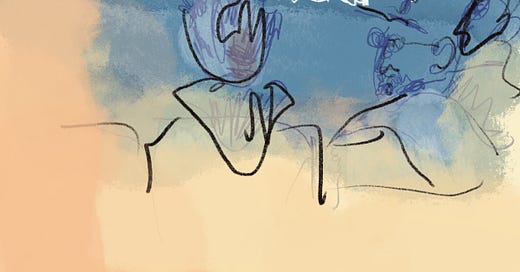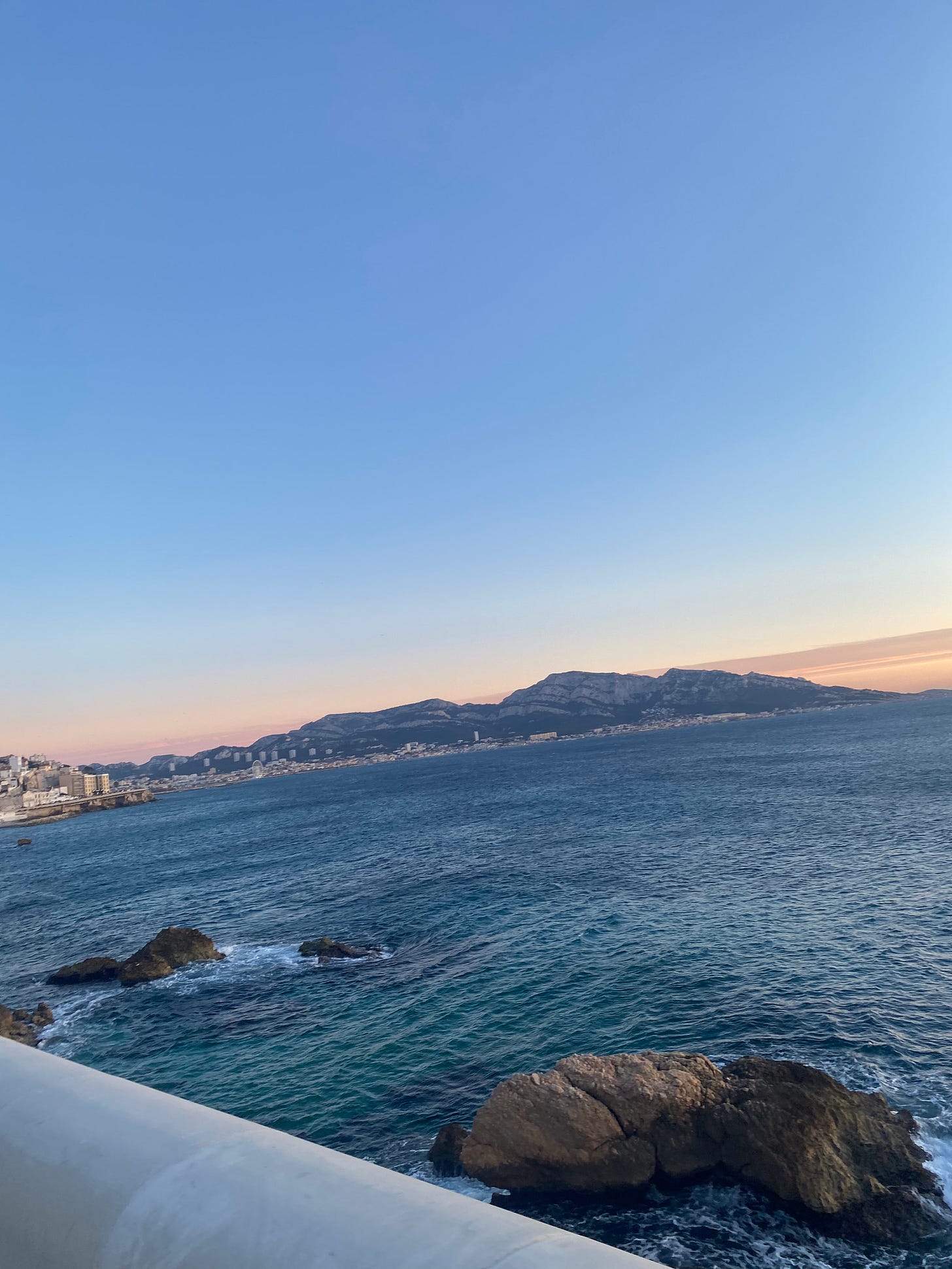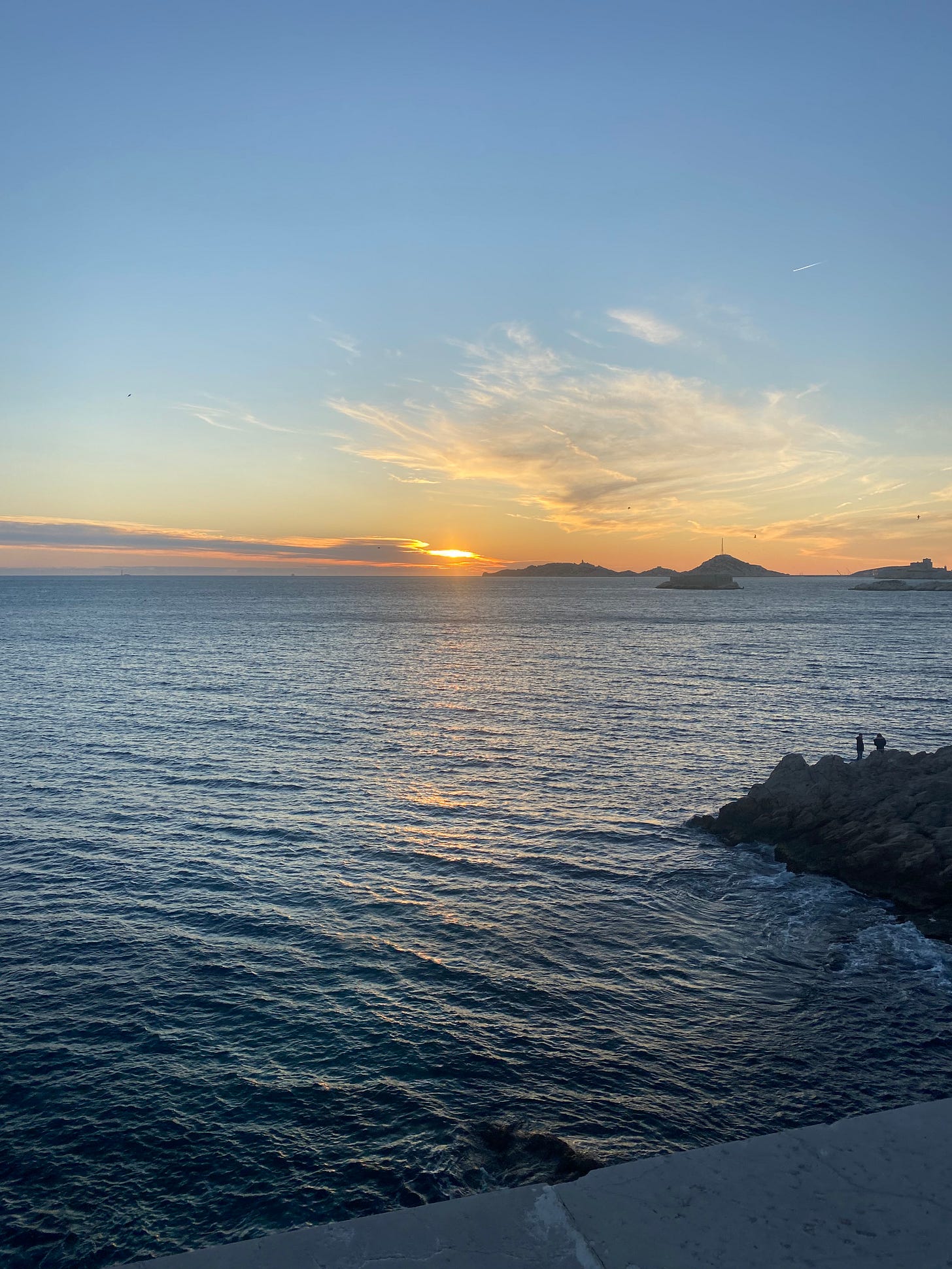Dear Friend,
I hope you have had a good week. I usually write on Sundays and it feels odd to write to you on a MONDAY. It’s like writing from another dimension. My excuse for writing on a weekday is that this week I am away in the south of France, in Marseille, the gleaming and teeming city by the sea.
After a very long and grey January in the capital, the weekend here has felt like a tonic. The southern sun first appeared on the third hour of the three-hour train journey from Gare de Lyon. It spilled into the train window, across the plastic-topped tables, and the rack of precariously stacked suitcases and I felt a clichéd yet undeniable sense of optimism. It’s like the words in a Nina Simone song that I really love called Another Spring.
“When it’s warm, And the sun is out, It’s like my heart’s restored.”
When you come out the station at Marseilles, you arrive onto a kind of giant stone esplanade whose height gives you a panorama over the city. The Notre Dame de la Garde church, atop a hill and itself topped by its fishermen-protecting Mary, rises up on the skyline in the distance.
Yesterday I bought a little book called “Ecrire Marseille” (Writing Marseille), which has extracts from books by various famous French authors, describing the city either in fiction or memoir. I loved this quote from the great writer and sage Simone de Beauvoir, describing how it felt to arrive at the station esplanade for the first time.
FR “J’avais laissé ma valise à la consigne et j’immobilisai en haut du grand escalier. “Marseille” me dis-je. Sous le ciel bleu, des tuiles ensoleillées, des trous d’ombres, des platanes couleur d’automne ; au loin les collines et le bleu de la mer ; une rumeur montait de la ville avec une odeur d’herbes brûlées et des gens allaient, venaient au creux des rues noires : Marseille…
Je me mis à descendre l’escalier ; je m’arrêtais à chaque marche, émue par ces maisons, ces arbres, ces eaux, ces rochers, ces trottoirs qui peu à peu allaient se révéler à moi et me révéler à moi-même.”
EN: “After leaving my suitcase in the luggage storage, I found myself immobilised at the top of the great staircase. “Marseille”, I say to myself. Under the blue sky, the sunlit tiles of the roofs, the pockets of shadow, the autumnal-coloured plane trees; in the distance [I could see] the hills and the blue of the sea; a low murmur rose from the city, along with the smell of burned herbs, and the people were going and coming, [dipping in and out of] the pockets of dark shadowed roads…Marseille.
I began to descend the staircase; I stopped on each step, moved by these houses, these trees, these waters, these rocks, these pavements, which little by little revealed themselves to me and revealed me to myself.”*
*This is my own quite hasty translation, it MAY not be as good as the original French. Where I have taken a bit of licence to change the sentence structure, I have added square brackets.
It’s wonderful here. The weather is good, the food is delicious. In fact, Whenever I go to the south of the France, I become keenly aware of what a different country France is to England. Ok, Normandy and Picardy right at the top are not dissimilar to England. But it’s a whole different kettle of fish to have a country that has Mediterranean beach in it, that has palm tress and cacti and mild sunny days in February. It’s much harder to be austere and, well, protestant, in such conditions. Why would you want to laze and linger in cold England? But how could you not linger by the glimmering, sun-glinted sea in Marseille?
The time to learn to live
This year in France we have now had two strike days protesting President Macron’s proposed pension reforms, and are gearing up for a third tomorrow (on Tuesday 7 Feb). Discussion of the pension reform is omnipresent; every morning I wake up to French news station France Info, and every morning this is one of the top items on the agenda. The parliamentary process to make the changes starts this week and the debate and unrest will most certainly go on well into 2023.
I’m really determined to follow what is going on and to understand the driving force of the protest. As I wrote a few weeks ago, from a British perspective, the proposal to raise the pension aged from 62 to 64 does not seem too extreme. I said previously:
“From the perspective of an outsider, 64 seems a reasonable enough retirement age, and sometimes it’s hard to understand the argument seen on placards at the protest that these reforms will see people dying on the job (the current average life expectancy here is 82+). But then again, I have to admire the zeal with which French people protect their rights. ‘Why do they complain when they have it so good?’, we think — but you could also argue that they have it so good because they complain.”
In 2018-19 when the Gilets Jaunes protests were at their height, I could see how differently they were depicted and understood inside the country and out of it. Judging just by the foreign media, the impression was that the grass-roots movement was populated by car-loving, gas-guzzling reactionaries looking for an excuse for a day off work. But in reality it was much more complex. It’s true that some of the more agressive white men of the movement got most of the media attention, but actually some of the key actors and initiators of the movement were women, and progressive women at that.
I am thinking for example of Priscillia Ludosky, a young French woman of Martiniquais descent. She began her career working in a bank before starting her own green cosmetics business in the Paris region. She also began to get into activism — against economic inequality in France and also for environmental cause, for example, arguing for a transition away from petrol and diesel cars.
In May 2018 she published a petition calling for a range of measures to ease the strain on cost of living for regular people in France. In it, she suggested lowering the tax on items and materials of first necessity (including but certainly not limited to petrol), and lowering the salaries and expenses of senior civil servants and politicians. Her petition attracted about 1 million signatures and eventually got a direct response from President Macron. (Her story is really interesting and I would like to explore her work more, but for now I will get back to the theme of the current pensions strikes/protests).
SO, as I said, I wanted to understand this social movement better from the start, to grasp the key objections to the reforms, and to develop my own interpretation not based on simplification or stereotypes. Here are some key/interesting points that I have gleaned so far in general:
While it is true that on the whole French people now live longer than they did when pension laws were first introduced in the 20th century, opponents of the reforms argue that the government’s proposals to raise the pension age and to increase the years of contribution required to claim the full pension are still unfair and inhuman.
One argument is based on the conditions of work for manual labourers and those providing person-to-person care. People in these professions often start working very young and then spend decades carrying out strenuous and repetitive tasks, like digging and carrying, or physically lifting elderly people who require domestic help. Opponents of the reforms argue that although such workers do the labour that society is literally and figuratively built on, they tend to die well ahead of the median life expectancy of 82.
Another argument is that the proposed increase in the minimum required years of contribution disadvantages those who worked part-time and those who had gaps in their career. (“Trous dans la raquette” or ‘ holes in the raquette’, as one French friend said to me). This often means women. Although the government does top up pension payments when women take/ took maternity leave, this doesn’t account for: women who went part-time to take on unpaid labour in the home, lower salaries often paid to women, time taken off work to follow a man’s career, and so on. In fact, the Government actually said last week that the reforms do in fact ‘penalise’ women (though the PM Elisabeth Borne has tried to back-pedal since).
I have also gathered that Macron has really staked his whole reputation on these reforms, it has really been his flagship project for a long time. Equally, from the start of his first mandate in 2017, he has been accused of being a ‘president for the rich’ and, for his detractors, this legislation is seen as the ultimate symbol of that. They see it as a harbinger of the direction of travel for the country, the thin end of the wedge. If they cede, their cherished rights will be eroded further.
Critics argue that the funding for pensions could come from taxing huge businesses with windfall profits e.g. LVMH, Total etc. And/or from asking employers to increase pension pot contributions. Currently about 70 percent of the population are against the reforms.
The left-wing France Insoumise party has tabled 13,000 amendments to the legislation in parliament.
It’s going to be an interesting year.
Thirty-second book club
In my quest for pension smarts, last week I read Le temps d’apprendre à vivre (The time to learn to live) by Francois Ruffin. Ruffin is a French journalist and France Insoumise politician who rose to fame for his documentary Merci Patron ! (‘Thanks Boss!’) about Bernard Arnault, the founder of luxury conglomerate LVMH and currently the richest person in the world. This particular book is all about the fight against the retirement reform.
At the start of the extended essay, Ruffin cites the Post-war consensus that, as in the UK, led to the building/reinforcement of the pillars of the welfare state. He cites a postwar Communist minister named Ambroise Croizat, who declared that retirement must no longer be the “antechamber of death, but a new stage of life”.
Later on, he also cites a German sociologist called Harmut Rosa, paraphrasing ideas from a book called Alienation and Acceleration.
“In our modern societies, what is making us unhappy is time — the time we don’t have enough of, the time that is rushed. Without a doubt, technology has accelerated: we can travel more kilometres in an hour, transfer more data in a minute, complete tasks more rapidly. So intuitively you would think this would free up time and possibly allow us to slow down. And yet no, au contraire — the opposite is true. Why? By what paradox? It is that the the actual number of tasks to do is increasing.”
These words are especially interesting in the context of the advent of ChatGPT, the AI super-brain that can intelligently create complex material, from website code to book reports. This week I met a dynamic friend of a friend who works in technological innovation and future planning. Her perspective is refreshing because she is super excited and enthusiastic about technology. In a society where many, very much including myself, have a luddite instinct, it is interesting and I think necessary to hear from those who have their eyes wide open to the full reality of technological change, for worse and for better. In her view, problems like addiction to social media and disconnection from other people don’t come from the technology itself, but rather the prevailing values of the companies which have come to dominate the technological scene. In response, we as users must be intentional and thoughtful about the way we use technology to enhance our lives, and the way that we minimise its potential harms. After showing me the cleaning-sharing app by which she runs her household and the travel app with which she plans her holidays, she explained her approach: “I use the technology, it doesn’t use me”.
I have also been reading Rest is Resistance: A Manifesto by Tricia Hersey, an artist, poet, theologian and community organiser. I have mentioned her work in this letter before. It is complementary to all these ideas and also adds the specific viewpoint of the Black Liberation movement. Hersey is also known as ‘the Nap Bishop’ and has been a big influence in bringing ideas of rest as resistance into the mainstream. Her work draws strongly from Afrofutuism, with a focus on the importance of a spiritual/creative hinterland that she calls The DreamSpace. According to the book, her aim is to “disrupt and push back against capitalism and white supremacy by connecting to the liberating power of rest, daydreaming, and naps as a foundation for healing and justice”
I thought this extract was particularly powerful:
“The beautiful interruption of rest needs to happen now. We cannot wait for the perfect opportunity, the perfectly curated events, or the perfect moment for us to leave our capitalist world. …
What matters is that in our hearts and souls we have decided to refuse and not wait until we have enough or have the perfect number of external things for our rest to be approved by the larger system. We do not need the participation of grind culture to be able to claim our bodies and time as our own. Black people have a direct connection to the brutality of capitalism. Our bodies were America’s first capital and our rest and DreamSpace are stolen constantly.”
The ideas also echoed for me with the writings of Joshua Abraham Herschel that I mentioned a few weeks ago, more particularly his thoughts on the Sabbath and the sanctity of time and introspection.
In his book, Francois Ruffin cites working conditions in the US before the Reagan era to emphasise that no state of affairs is inevitable. He writes throughout the 1960s and 1970s, American workers worked fewer hours than their European counterparts. He aims to highlight how the seemingly sub-standard can quickly become normal, and how the rights you once had can quickly become a distant dream disappearing in the rear-view mirror.
On that note, I’ll wrap up! Thank you for reading this letter from Marseille. Please indulge me: below I am going to add in some photos from the weekend.
Have a good week, and I will write next week!
Yours,
Hannah











I learned a lot which I’ll promptly forget about French and their grievances. Really fascinating and nuanced explanation. Merci
Splendid peice Hannah!
I went to visit Marseille with Kate quite some years ago . We went on a very hair raising little " road train" from the Bascillica on top of the hill right to the centre of the town . Having crawled up slowly on the ascent. Unforgettable!
Loved the alarming and rather beautiful photoshopped banner of Margaret Macron as held by a young protester in your photo.
Really , Emanuel makes a very striking and quite elegant Margaret Thatcher look alike .
Very chic!
I love the description of your train journey Hannah, particularly the glorious thought of actual sunshine and warmth. Now Scotland , where we live is dramatic, rugged and magnificent. Rich and abundant in wildlife bith at sea and on land. But its bone chillingly cold at this time of year andin the words of Kirsty McColl " No placefor the old" 🤗😂
So looking forward to a visit to Paris in Late March to see you all and bask in a little yellow French sunshine whilst sipping coffee and gazing at the sunbeams bouncing off the Sienne... thank you for your warm and welcoming words on your lands delightful climate x